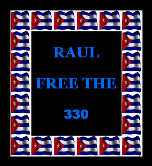
While we all hope that the death of Fidel, brings about swift change in Cuba, this possibility seems highly unlikely.
With a more pragmatic dictator, in charge , we are probabaly headed for a meaner, leaner repression machine in the short term.
The re-eleclection of Hugo Chavez to Venezuela's presidency earlier this month, dashed any hopes of a quick democratization in Cuba.
This from the Orlando Sentinel. An objective , factual article with no praises for the free education and healthcare that is "endured" by all Cuban Citizens.
With a more pragmatic dictator, in charge , we are probabaly headed for a meaner, leaner repression machine in the short term.
The re-eleclection of Hugo Chavez to Venezuela's presidency earlier this month, dashed any hopes of a quick democratization in Cuba.
This from the Orlando Sentinel. An objective , factual article with no praises for the free education and healthcare that is "endured" by all Cuban Citizens.
Cuba's remarkable macroeconomic performance in the past two years, mainly fueled by a productive partnership with Venezuela and, to a lower extent, soft credits from China, will reduce the need for major liberalizing reforms and offer incentives to stay the course. Albeit using a new calculation method that substantially inflates the value of its economy, Cuba reported a GDP growth of 11.8 percent in 2005 and 12.5 percent in 2006.
Just to give an idea about Venezuela's vital role in the Cuban economy, exports of professional services, mostly medical ones under special agreements with Caracas, generated $2.9 billion or about 40 percent of Cuba's total hard-currency revenues in 2005, replacing international tourism as the island's most important source of foreign exchange. And while earnings from tourism stagnated and remittances from abroad suffered a decline in 2006, Havana's authorities estimate that exports of professional services will peak at $5 billion this year, accounting for almost half of total revenues.
Considering Cuba's growing dependence on Venezuela, and the fact that President Hugo Chavez has just won re-election to another six-year term, it is likely that Raul will retain close ties with Caracas and avoid major policy changes that could jeopardize such a profitable relationship.
In conclusion , author Paolo Spadoni , assistant professor in the department of political science at Rollins College in Winter Park, correctly points out:
In short, anyone who expects Raul Castro to quickly promote a major transformation of the Cuban economy along capitalist lines, and abandon the existing socialist model, will remain disappointed. The new Cuban leader will likely introduce some gradual and limited market reforms aimed to translate the current macroeconomic bonanza into actual development, improve living standards, and guarantee popular support for his government.
Raul knows that he needs to make some economic consessions to the Cuban people in order to avoid a political crisis.
The Cuban regime under Raul, has thusfar been more reactionary than it had been under his brother. Its decisions so far have been made in reaction to American, exile and dissident actions or statements.
This is a clear indication that the regime percieves that there are pressures in and out of Cuba that may evolve into a crisis. In the past, Fidel would invite crises as a way to consolidate and strengthen his political control. The new regime will only weaken from any crisis so it is therefore trying to avert any form of crisis until power is further consolidated.







2 comments:
hahaha papi chulo. i'm changing the name of the post.
Post a Comment